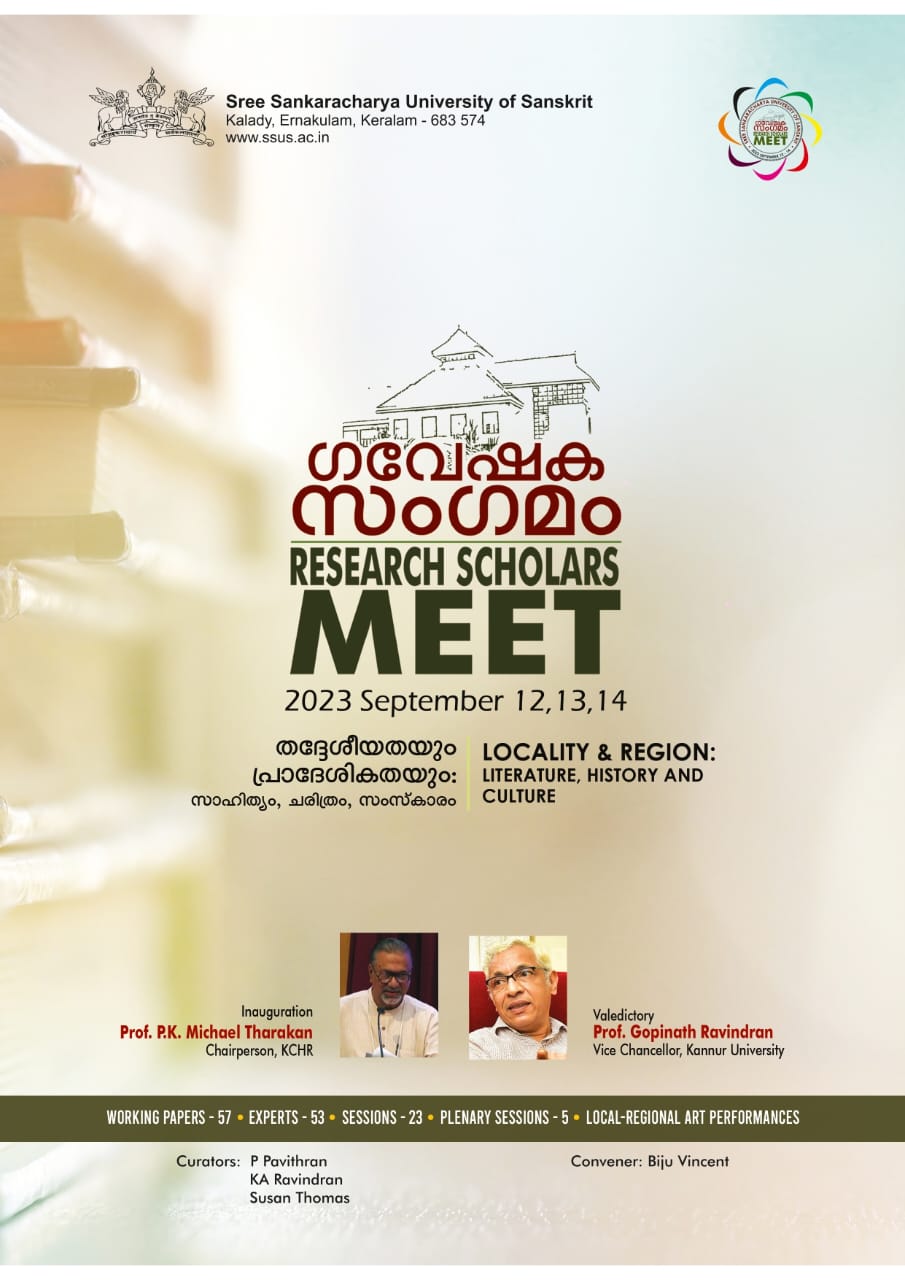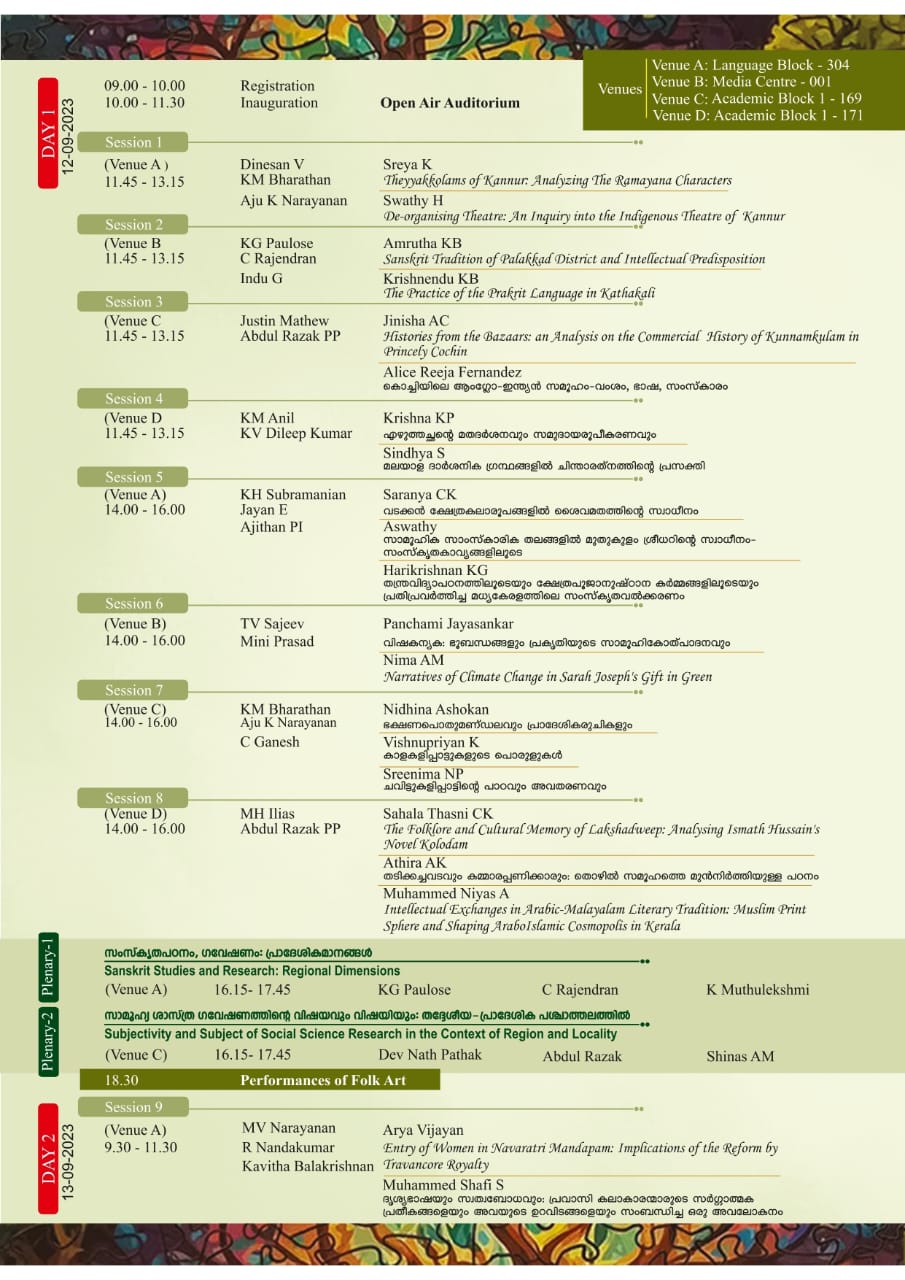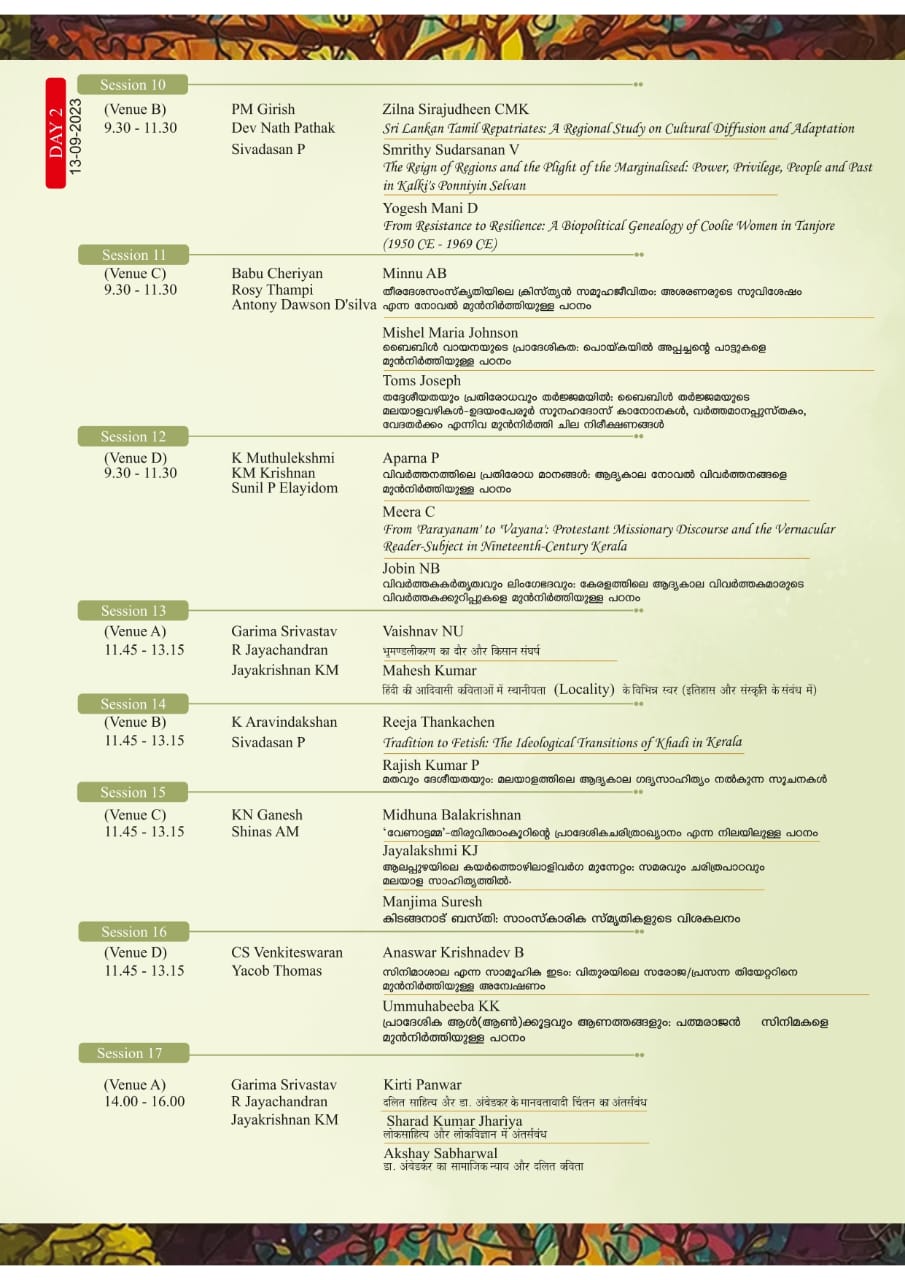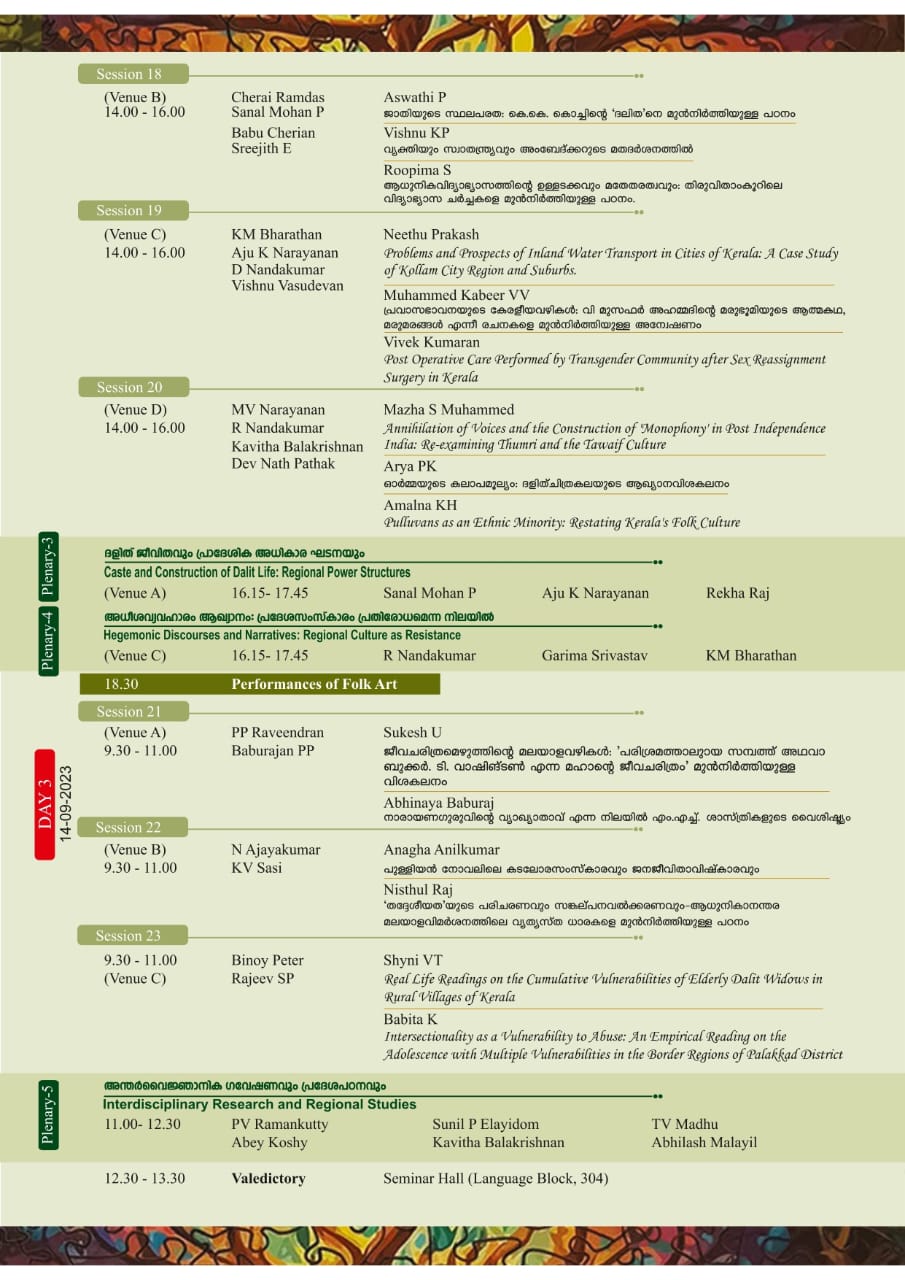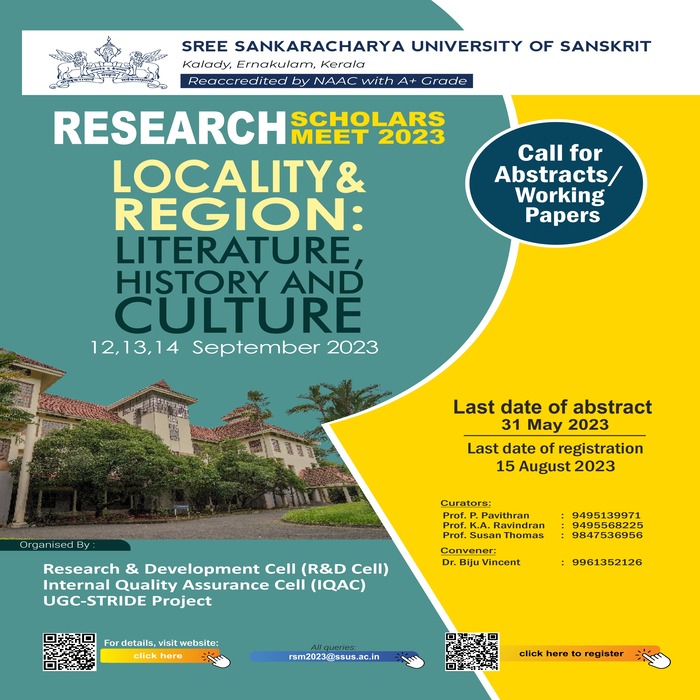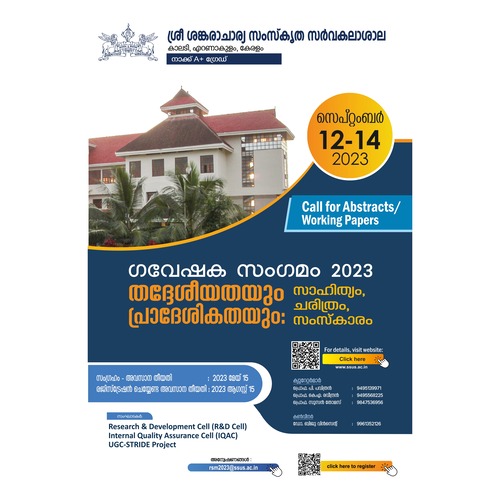RESEARCH SCHOLARS MEET 2023
12,13,14 September 2023
Locality & Region: Literature, History and Culture
: Rs. 300/- (SC/ST applicants)
: Rs. 150/- (SC/ST applicants)
Last date for the submission of abstract: 31 May 2023
Extended abstract: 500-750 words
Email: rsm2023@ssus.ac.in
Intimations of the acceptance: 01.07.2023
Submission of the full working paper/scripts: 15.08.2023
Last date of registration: 15.08.2023
Registration fees : Rs. 500/- (General & OBC applicants)
: Rs. 300/- (SC/ST applicants)
Registration fees, for the scholars in SSUS:
: Rs. 300/- (General & OBC applicants)
: Rs. 150/- (SC/ST applicants)
Registration Link : https://docs.google.com/forms/d/e/1FAIpQLSeC9guxjjxeNa8fZrcl-W_Ce2ZZyCzyat54S9BEXeyezwaI7A/viewform
Account Details:
Name of the Account Holder: Finance Officer
Account No: 338602010014001
Union Bank of India, Kalady University
IFSC: UBIN0572080
- All information regarding the conference shall be uploaded in the university website.
Therefore, participants are requested to have periodic updates from the university website.
2. The abstracts shall be original and connected to the theme of the Meet.
3. The last date for the submission of the abstract shall be 15.05.2023.
4. The abstract shall contain two sections:
a) The first page contain Name, Address of the Research Scholar, e-mail id &
Phone number along with the Title of the Paper.
b) The second (or the remaining) page shall include title and content / abstract
of the paper to be presented. No identification marking should be used in the
second page, since the abstract will be sent for the blind review.
5. The matter should be typed in UNICODE with 1.5 line spacing and submitted in
Word format and PDF to UNICODE font and size are detailed below:
|
Medium |
UNICODE Font |
Size |
|
English |
Bookman Old |
12 |
|
Sanskrit |
Kokila |
16 |
|
Hindi |
DVTT Surekh |
16 |
|
Urdu |
inpage |
12 |
|
Malayalam |
Manjari/Anjaly (Old Lipi)/ Nirmala |
16 |
- A scholar can submit only one abstract for approval and presentation
- Abstracts shall be sent to rsm2023@ssus.ac.in
- Registration is mandatory for presenting research paper and participating the Research Scholars Meet.
- Accommodation to the registered participants shall be given.
- Every presenter shall be allotted 30 minutes for presentation and discussion.
- Abstracts previously presented will not be accepted.
- All abstracts accepted for presentation will be published prior to the Meet.
- Please note that the submitting author will receive all correspondence about the abstract. If the submitting author is different, the submitting author should furnish the details of the presenting author.
- Abstract, roughly, shall include purpose of study, methodology, summary of findings/results, conclusion and significance / contributions of study.
About the Reviewing Process
- Your abstract will undergo a double-blind peer review by the Abstract Screening Committee.
- Results of the abstract review will be sent to the author on or before 17 June 2023.
- If a revision is required, the revised abstract must be sent back within the stipulated/mentioned date.
- If your abstract is accepted, you will be invited to register and present the research
paper in the Research Scholars Meet 2023.
Important Information for the Co-Authors
- It is to be noted that a single registration permits only one person to attend/participate the Research Scholars Meet 2023.
- If the co-authors would like to attend the Research Scholars Meet, their registration and payment are required to be made independently.
- The certificate will be issued for the co-authors upon their registration / payment for the Research Scholars Meet.
- Scholars registered for PhD programme
- Scholars awarded Ph.D. within one year
Sree Sankaracharya University of Sanskrit is to hold a Research Scholars Meet in Languages, Humanities, Social Sciences and Fine Arts, from 12 to 14 September 2023.
The main focus/ theme of this meet are local/regional literatures and their socio - cultural linkages. In the context of globalization, on one side there is a threat faced by the regional/ local to survive and endure, while on the other side, the local/ regional has gained more relevance. A nation centric approach often does not accommodate the everyday life and relationships of the people. This can only be gleaned from the researches done at a local level. Locality studies rooted in the local/ regional will reveal the life worlds of the people and their relationships. It is through researches at the local level that we can understand the cultural manifestations and the life worlds of the marginalized sections such as the adivasis, the dalits and the women. They might often exist outside the ambit of organized religions, customs and practices.
When researchers enter the university, a knowledge production centre, they become compelled to internalize the international or national subjectivity, academically. This, many a time, becomes a limitation when the researcher is forced to look at her/his society from the gaze of an outsider. It creates obstacles in critically examining the interstices of the internal contexts her/ his identity formation within the material contexts. This will lead to a loss of the capacity of the knowledge so produced to percolate to the grassroot level from where its data are derived. Locality studies play
a crucial part in addressing one’s own subjectivity. The knowledge produced through such a process will only then become beneficial to the locality. Thus the university will become an agency of modernization through local / micro level researches.
To understand Sanskrit studies from the point of view of the modern value systems, it is inevitable that we probe into its local roots by understanding its historical and material contexts. The need of the hour then is to unravel the diverse local/ regional knowledge of Sanskrit, and link it to the life world of the people and the networks of other related knowledge systems.
Local or regional studies can be conceived (analyzed) at three levels:
1. Choosing of the topic or theme: Topics of enquiry that have been marginalized at the larger national level researches.
2. Methodology of locality studies: To show how these locality/regional studies can be different from that of larger macro level national studies through its methodologies.
3. At the level of the data collated: Data for these studies has to be derived from the local/ micro level. Through these micro level studies, data or knowledge that has been set aside or unaccounted for in larger national and international level studies can be unearthed.
The meet aims to unravel these three levels of researches. Though the focus of the meet is on Kerala, it is also an attempt to understand various themes of local or regional levels in a pan Indian context. The meet hopes to bring together researches in language; literature; fine arts; culture; history; social, caste and community formations; hierarchies of power especially at the level of caste and gender relations; psychology; geography; social work; sociology and other such areas. The oral narratives and experiences are more important for local knowledge beyond written knowledge. It is not only memories of the individuals that are pertinent but also the memories treasured or transmitted within or by the communities. It is also important to realize the changes that occur at the emotional level and its causal agencies. By understanding the potential of inter-disciplinary methodologies, locality studies will become more concrete while coming closer to the experiences or knowledges at the local level. Through this, research at the micro level and at the university level can be transformed from being merely information to being interventions in the aesthetic or experiential lives of the people at the local level.
Sub-Themes:
-
Papers shall be focusing on the sub-themes, but not limited to them.
- Local Sanskritic traditions
- Local/regional literature
- Gender, hierarchies and power relations
- Community and marginalised communities
- Local histories & initiatives
- Folk and classical knowledge systems
- Art, literary and theatre movements
- Sociology & Anthropology of local traditions & practices
- Psychology of regional cultures and social cognition
- Histories of agrarian and urban transitions
- Politics of space & geographies
- Political movements
- Oceanic socio-cultural world: networks and interactions
- Ecology & environmental studies
- Print journalism & magazines
- Jurisprudence
- Religious studies
സര്വകലാശാല എന്ന വിജ്ഞാനോല്പാദന കേന്ദ്രത്തില് എത്തിച്ചേരുന്നതോടെ അന്തര്ദ്ദേശീയമോ ദേശീയമോ ആയ ഒരു വിഷയത്തെയും സ്വത്വത്തെയും അക്കാദമികമായി സ്വാംശീകരിക്കാന് ഒരു ഗവേഷക നിര്ബന്ധിതമാകുന്നുണ്ട്. സ്വന്തം സമൂഹത്തിലേക്ക് പുറത്തു നിന്ന് പ്രക്ഷേപിക്കുന്ന നോട്ടമായി അത് പലപ്പോഴും പരിമിതപ്പെടാറുമുണ്ട്. ഗവേഷകയുടെ സ്വത്വത്തെ തന്നെ രൂപീകരിച്ച ആന്തരിക ബന്ധങ്ങളെ മൂര്ത്ത സന്ദര്ഭങ്ങളുമായി ബന്ധപ്പെട്ട് വിമര്ശനാത്മകമായി കാണുന്നതില് ഇത് തടസ്സവുമായി മാറിത്തീരാറുമുണ്ട്. നിര്മിക്കപ്പെടുന്ന അറിവ് ജനതയിലേക്ക് തിരിച്ച് ഇറങ്ങി പ്രവര്ത്തിക്കുന്നതിനുള്ള ശേഷി അതു വഴി നഷ്ടപ്പെടുകയും ചെയ്യുന്നു. സ്വന്തം വിഷയിത്വത്തെക്കൂടി സംബോധന ചെയ്യുന്ന പഠനങ്ങളിലൂടെയാണ്. പ്രദേശപഠനം അതില് നിര്ണായകമാണ്. സര്വകലാശാലയില് നിര്മിക്കുന്ന അറിവൂരൂപങ്ങള് പ്രദേശത്തിന് പ്രയോജനകമാകുക എന്ന പ്രക്രിയയും ഇതിന്റെ ഭാഗമാണ്. പ്രാദേശിക തലത്തിലും ആധുനികീകരണത്തിന്റെ ഏജന്സിയായി സര്വകലാശാല മാറുന്നത് അപ്പോഴായിരിക്കും.
സംസ്കൃത പഠനത്തെയും ഗവേഷണത്തെയും ആധുനിക മൂല്യവ്യവസ്ഥയുമായി ചേര്ത്തുനിര്ത്തുന്നതിന് പ്രാദേശികമായുള്ള അതിന്റെ ചരിത്രവും പ്രയോഗത്തിന്റെ മൂര്ത്ത സന്ദര്ഭങ്ങളും മനസ്സിലാക്കേണ്ടത് അനിവാര്യമാണ്. കേരളത്തിലെ വിവിധ പ്രദേശങ്ങളില് സംസ്കൃതത്തിന്റെ അറിയപ്പെടാതെ കിടന്ന മതാതീതമായ പ്രയോഗ സന്ദര്ഭങ്ങളും ജനജീവിതത്തിന്റെ വിവിധ മേഖലകളിലെ പ്രാദേശികമായ അറിവുരൂപങ്ങളുമായി അതിനുണ്ടായിരുന്ന വിനിമയ ബന്ധങ്ങളും കണ്ടെടുക്കേണ്ടത് പുതിയ കാലഘട്ടത്തില് ആവശ്യമാണ്.
പ്രദേശ പഠനത്തിന് മൂന്നു തലങ്ങള് സങ്കല്പിക്കാം:
1. വിഷയ തലം: പ്രാദേശികമായ വിഷയങ്ങള്- രാഷ്ട്ര യുക്തിയില് പിന്തള്ളപ്പെട്ടുപോയ വിഷയമേഖലകള്
2. രീതിശാസ്ത്ര തലം: പ്രദേശ പഠനത്തിന്റെ രീതിശാസ്ത്രം- അന്തര്ദ്ദേശീയവും ദേശീയവുമായ പഠനങ്ങളില്നിന്നും വ്യത്യസ്തമായി പ്രാദേശികതലത്തിലുള്ള പഠനത്തിന്റെ രീതിശാസ്ത്രം എത്രത്തോളം വ്യത്യസ്തമാണ്.
3. ദത്തതലം: പ്രാദേശികമായി കണ്ടെത്തേണ്ട ദത്തങ്ങള്-ദേശീയ, അന്തര്ദ്ദേശീയ തലത്തില്ത്തന്നെ നിലനില്ക്കുന്ന അറിവു നിര്മാണത്തില് നിന്ന് തമസ്കരിക്കപ്പെട്ട നിരവധി ദത്തങ്ങള് പ്രാദേശിക തലത്തിലുള്ള പഠനം വഴി കണ്ടെത്തപ്പെടേണ്ടതുണ്ട്.
ഈ മൂന്നു നിലയിലും ഗവേഷണത്തെ തിരിച്ചറിയാനാണ് ഈ സംഗമത്തില് ശ്രമിക്കുന്നത്. കേരളത്തെയാണ് മുഖ്യമായി ഫോക്കസ് ചെയ്യുന്നതെങ്കിലും അഖിലേന്ത്യാ തലത്തിലും വിവിധ വിഷയങ്ങള് പ്രാദേശിക തലത്തില് പ്രവര്ത്തിക്കുന്നതും ആവിഷ്കരിക്കപ്പെടുന്നതും എങ്ങനെ എന്ന് ഈ സംഗമത്തില് ചര്ച്ച ചെയ്യാന് ഉദ്ദേശിക്കുന്നു. ഭാഷ, കലാസാഹിത്യാവി ഷ്കാരങ്ങള്, സംസ്കാരം, ചരിത്രം, സമൂഹഘടന, സമൂഹവിഭാഗങ്ങള്, ജാതി അധികാര രൂപങ്ങള്, ലിംഗപദവി ബന്ധങ്ങള്, തത്വചിന്ത, മനശ്ശാസ്ത്രം, ഭൂമിശാസ്ത്രം, സാമൂഹ്യപ്രവര്ത്തനം തുടങ്ങി വിവിധ മേഖലകളിലുള്ള ഗവേഷകരുടെ പങ്കാളിത്തമാണ് ഈ സംഗമത്തില് പ്രതീക്ഷിക്കുന്നത്. രേഖാപരമായ അറിവുകള്ക്കപ്പുറത്ത് വാമൊഴിയും അനുഭവ വിവരണവുമുള്പ്പെടെയുള്ള കാര്യങ്ങള് പ്രാദേശിക തലത്തിലെ അറിവിന്റെ മേഖലകളില് കൂടുതല് പ്രസക്തമാണ്. വ്യക്തികളെന്ന നിലയില് മാത്രമല്ല, കൂട്ടായ്മ എന്ന നിലയിലും സൂക്ഷിക്കപ്പെടുന്ന ഓര്മകളും പ്രസക്തമാണ്. ഭാവുകത്വത്തിന് പ്രാദേശികതലത്തില് സംഭവിക്കുന്ന മാറ്റങ്ങളുടെ ഏജന്സികളെ കണ്ടെത്തുന്നതും പ്രധാനമാണ്. വിവിധ ജ്ഞാനമേഖലകള് തമ്മിലുള്ള പരസ്പര പ്രവര്ത്തനം തിരിച്ചറിയുന്നതു വഴി പ്രദേശ പഠനം അന്തര്വൈജ്ഞാനികമായ പഠനങ്ങളുമായിത്തീരുന്നു. അനുഭവവുമായി കൂടുതല് അടുക്കുന്നതു വഴി കേവലമായ വസ്തു നിഷ്ഠ അറിവു രൂപങ്ങള് എന്നതിനപ്പുറത്ത് സൗന്ദര്യാത്മകവും അനുഭൂതിപരവുമായതലവും പ്രാദേശിക പഠനത്തിന് കൈവരുന്നുണ്ട്. അടിത്തട്ടില് നിന്ന് രൂപീകരിക്കപ്പെടുന്ന ജനകീയ അറിവുകളെയും അനുഭവങ്ങളെയും തിരിച്ചറിഞ്ഞുകൊണ്ടുള്ള രാഷ്ട്ര നിര്മാണ പ്രക്രിയയുടെ ഭാഗമായി സര്വകലാശാലാ ഗവേഷണത്തെ നോക്കിക്കാണുകയാണ് ലക്ഷ്യം.
പ്രാധാന്യം നല്കുന്ന വിഷയ മേഖലകള്:
- സംസ്കൃതത്തിന്റെ പ്രാദേശിക പാരമ്പര്യം
- പ്രാദേശിക സാഹിത്യം/ പ്രദേശ സാഹിത്യചരിത്രം
- ലിംഗപദവി പഠനങ്ങള്
- സമൂഹ വിഭാഗ പഠനങ്ങള്
- സാമൂഹ്യശാസ്ത്രപഠനങ്ങള്
- പ്രാദേശികമായ സംരംഭങ്ങള്/മുന്കൈകള്
- ക്ലാസിക്കലും നാടോടിയുമായ അറിവുകള് / പാരമ്പര്യങ്ങള്
- നവോത്ഥാന പ്രസ്ഥാനങ്ങള്
- കലാ, രംഗകലാ മേഖലകള്
- അച്ചടി, പത്രപ്രവര്ത്തനം, മാസികകള്
- ഗ്രാമങ്ങളുടെയും നഗരങ്ങളുടെയും പ്രാദേശിക ചരിത്രങ്ങള്
- രാഷ്ട്രീയ പ്രസ്ഥാനങ്ങള്
- കടലോര സംസ്കാരവും സാമൂഹ്യസാംസ്കാരിക ബന്ധങ്ങളും
- പരിസ്ഥിതി പഠനങ്ങള്, പരിസ്ഥിതി ബന്ധങ്ങള്
- ഭൂവിനിയോഗ പരിണാമങ്ങള്
- നിയമമേഖല
- മത, മതേതര പഠനങ്ങള്
- സ്ഥല രാഷ്ട്രീയ പഠനം
- പ്രദേശവും സാമൂഹ്യ മനശ്ശാസ്ത്രവും
Organised by
Research & Development Cell (R&D Cell)
Internal Quality Assurance Cell (IQAC)
Stride Project






